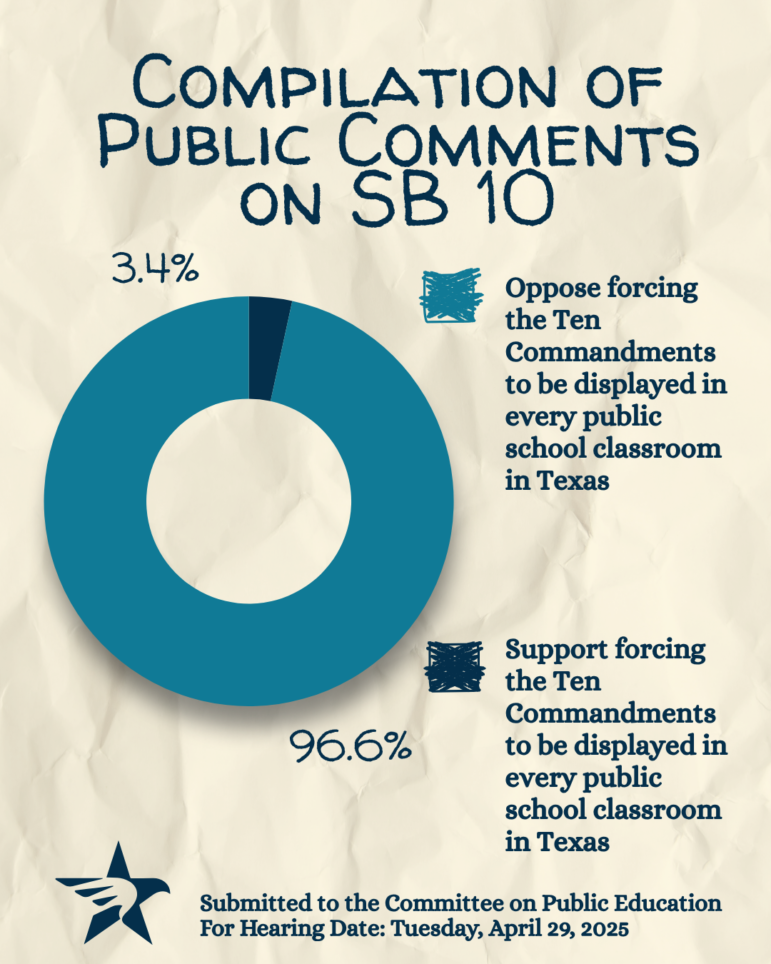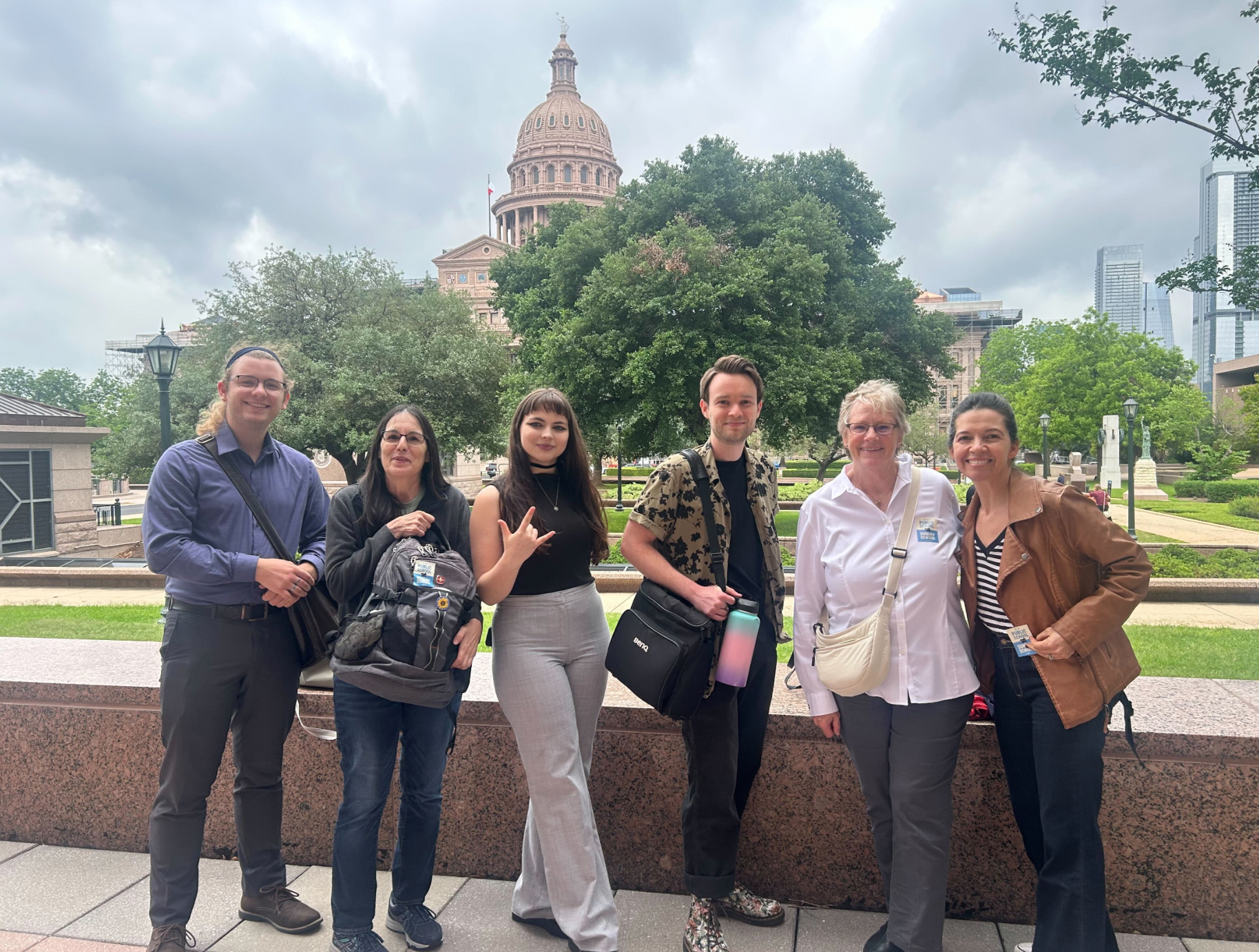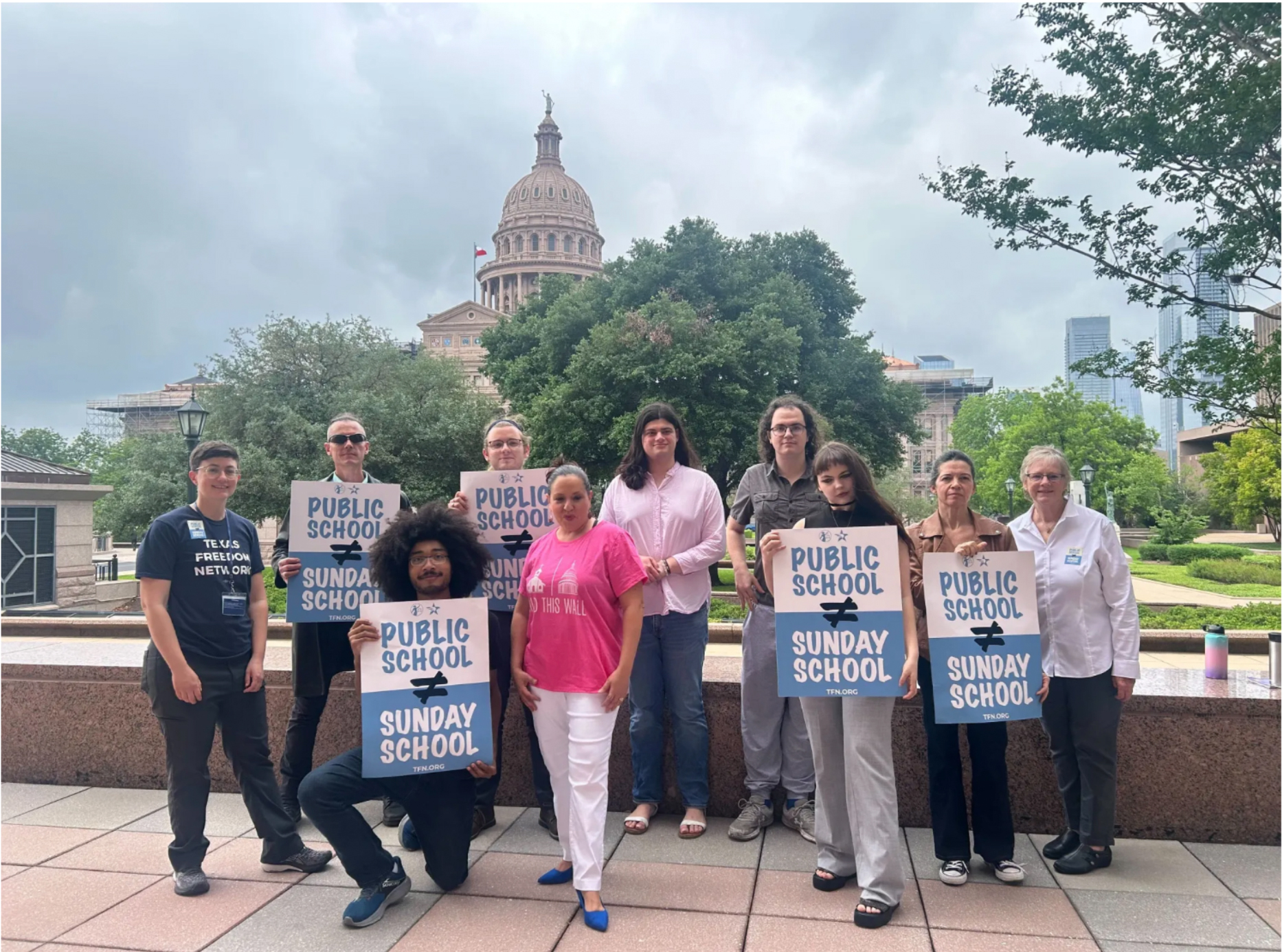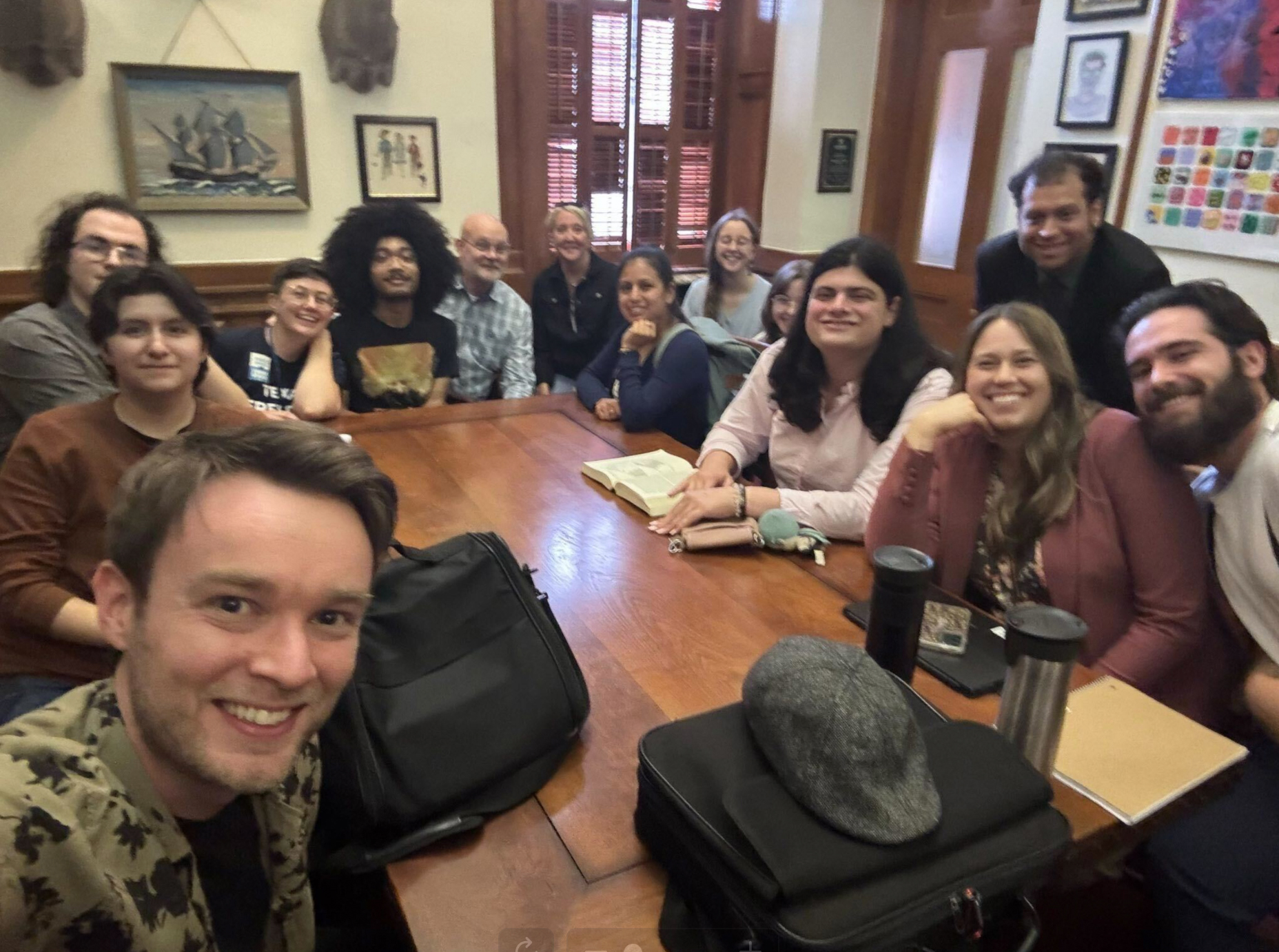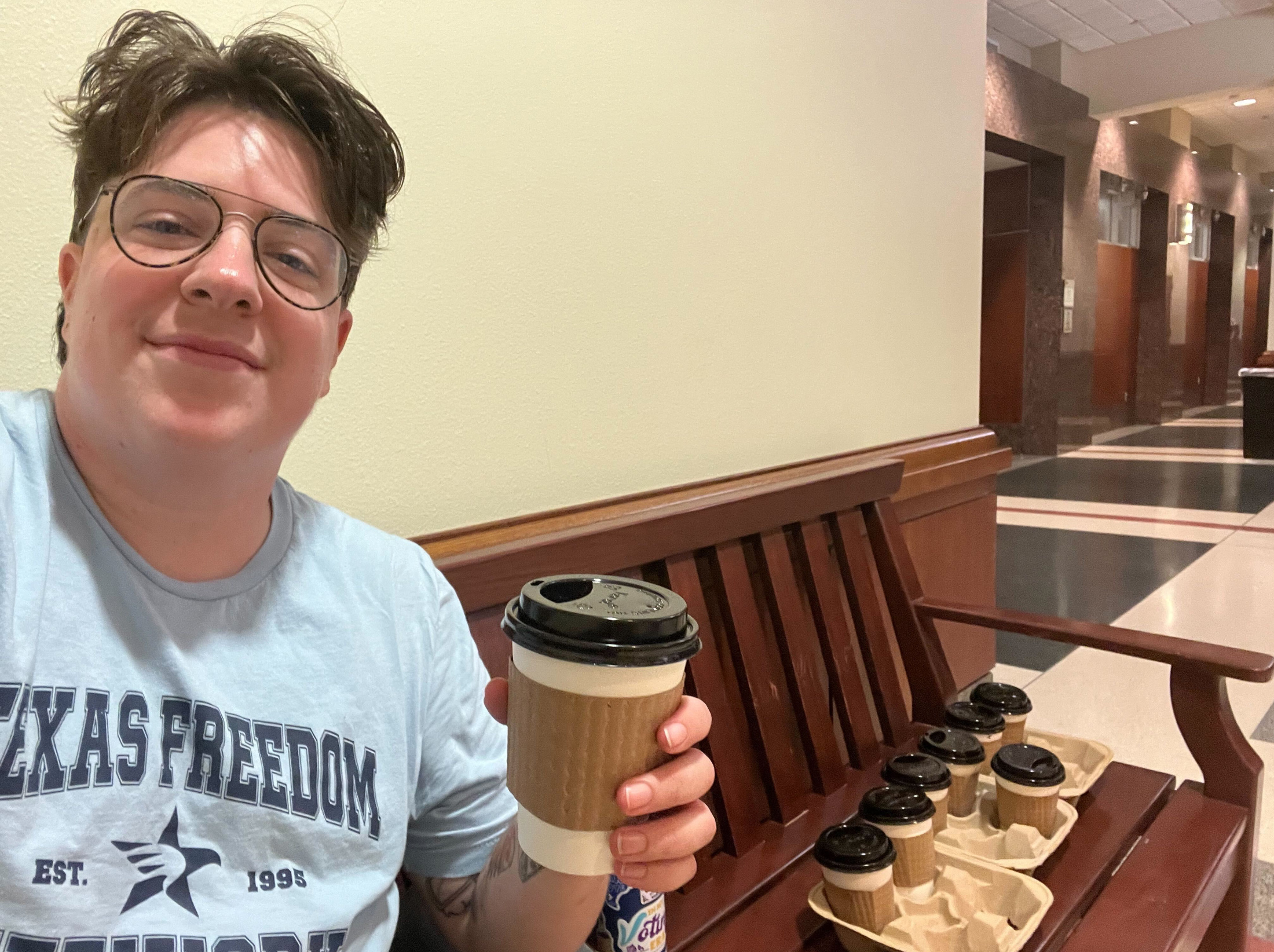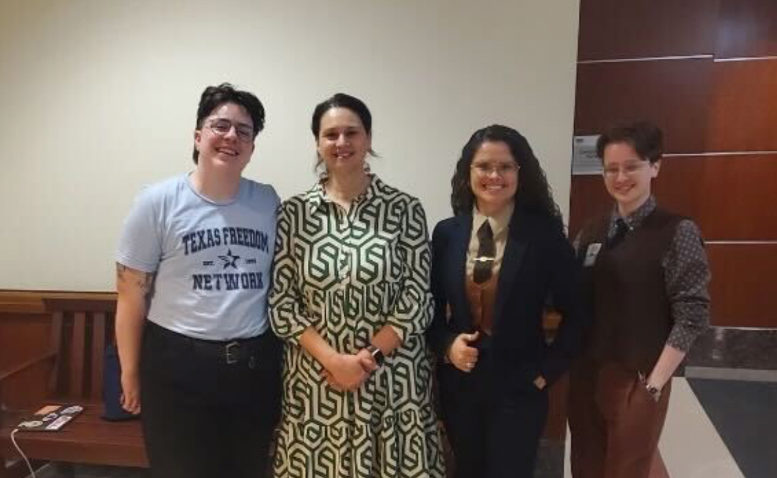By: Elva Mendoza and Erika Slaymaker
Excitement and inspiration gave way to frustration, disappointment, anger, and aggravation. Calculations were made: how much sleep do I need to function at my morning meeting?
Texas Freedom Network volunteers who traveled to the Texas Capitol on April 29 from as far away as the Houston area found themselves waiting up to 20 hours to express their opposition to Senate Bill 10, the Ten Commandments bill. They wanted to speak directly to lawmakers about the harms of putting the state government in charge of children’s religious education. Many left in the early morning hours of April 30, exhausted, and without ever getting the chance to speak. It was not the first time, nor the last, that Texans would be shut out of the legislative process this session.
Why Public Testimony Matters in Texas Democracy
House and Senate committee hearings offer everyday Texans a rare opportunity to weigh in on bills moving through the legislative process. As opposed to phone calls, emails, and written comments, hearings offer constituents the opportunity to speak with lawmakers face-to-face about their lived experiences with proposed legislation and the potential impact of those laws. Constituent input is vital to democratic processes, and testifying in-person is one of the most impactful methods of providing that input publicly and on the record.
Staffers do log calls and emails and pass the general summary of overall feedback along to lawmakers. We certainly hope they review carefully the public comments submitted online. But with 544 comments submitted on SB 10 alone –– 96% of which were in opposition –– we very much doubt it. Many Texans are willing to go to great lengths to ensure legislators truly hear their voices on issues they are passionate about.
And great are the lengths required!
The Challenges of Testifying at the Texas Legislature
Testifying has never been an easy process. The sheer size of our state makes travel to Austin difficult for many. The public is given several days’ notice of when and where meetings will be held, along with a list of bills to be heard, but they are not told in what order bills will be heard. Some committee chairs hear controversial bills at the end of the agenda, perhaps to save the small number of witnesses attending for other bills from having to sit through hours of testimony; perhaps hoping for attrition of a large number of witnesses. Given the huge number of bills to be heard in just a few months’ time, the lists of bills are LONG, and have only become longer over the last two sessions.
Many committee hearings are interrupted by general sessions of the House or Senate, and there is no way to predict how long the hearings will be paused before resuming. Late in the session, lawmakers can ignore the usual hearing notice requirements, and committee chairs always have the power to limit testimony in various ways. And of course, much of this takes place during business hours, when most Texans are at school or work (or in the middle of the night, when most people are asleep). It is an uphill battle.
I think it’s the process that makes it so hard for citizens to testify, to make their voices heard.”
–Terra Anders, TFN volunteer
This Session’s Unprecedented Barriers
Those of us who have been around the legislature for several sessions are all-too-familiar with long wait times, but this session felt unprecedented. We witnessed committee chairs curtailing public input this session in ways we have not seen in the past, such as cutting off registration for a bill shortly after the start of a hearing (usually registration is allowed right up until a bill is being heard). One of the most egregious examples was the House Public Education Committee hearing on the Ten Commandments bill.
TFN Political Director Rocío Fierro-Pérez’s morning alarm goes off during her testimony – another reminder of how long she’s waited at the Capitol to testify.
The Marathon Hearing: A 22-Hour Ordeal
The committee gaveled in at 8:00 a.m., then took a break just over an hour later for members to attend a House floor session. They did not resume until almost 10 p.m. The Ten Commandments bill was called last, around 3:45 a.m. the next morning. By the time the committee completed 40 minutes of discussion with the bill author and another 40 minutes with three bill proponents invited by supportive legislators, the majority of individuals registered to testify against the bill had left.
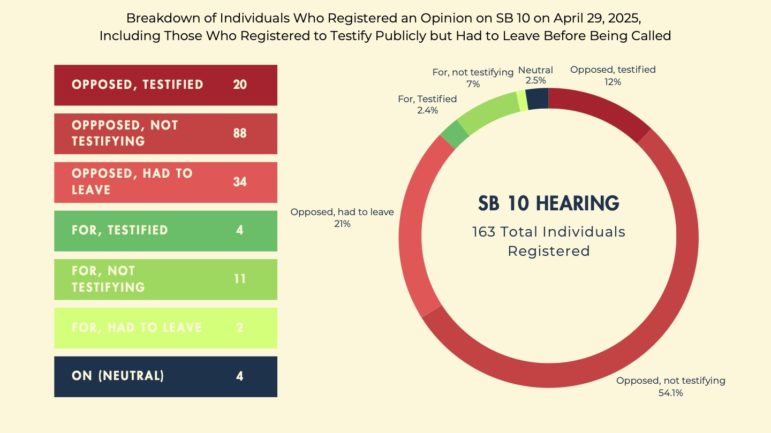
If the process were fair, transparent, and democratic, legislators would have heard from students like Danny Starling and Kaylee Davis. They would have heard from grandparents and parents like Terra Anders and Destiny Heckman. In all, 34 Texans who intended to testify against the bill could not endure the entire 22.5-hour wait. Some made it agonizingly close. Those of us still present to hear their names called but unanswered felt heartbroken for them.
Imagine that you are on a plane for eighteen hours, that’s what it felt like, like I just lost eighteen hours of my life.”
— Terra Anders, TFN volunteer
The Human Cost of Democratic Participation
The hearing room was like a meat locker; at least one of us was shivering uncontrollably from the cold at times. We were exhausted. We were hungry. Some volunteers drove from out of town and spent the night in their cars so they could be present when the hearing opened at 8:00 a.m. After all that effort, some of them still did not get to testify. Teenagers stayed as long as their curfew allowed, got an extension from their parents, but ultimately ran out of time. Over the course of the night, people made the difficult decision to throw in the towel and head home, until just 20 bill opponents remained to testify.

Why Volunteers Endure the Process
Why would anyone volunteer to sit around all day waiting for a chance that may never come?
For Terra Anders, it felt like a duty to her community and her grandchildren. “I think the whole idea of having an impact on our laws, the way that we as a country and a state live together in community, and are compassionate to others, that is what has made us an exceptional country. And so to be a part of that process is a real privilege that others don’t have. So I feel that it’s not just my duty, it connects me with others and to the world around me.”
“I don’t want to be the old person whose grandchildren ask the question, ‘What did you do to help save the country? Or the state?’ I would rather say I did everything I could, I didn’t just go quietly, I made my voice heard, and I did it for them, because they are my legacy.”
For Danny Starling, the divisive and isolating nature of the bill was a prime motivator. “For me, as someone who is nonreligious, it is definitely isolating to be in an environment that has religion as the top priority, that is implicitly or explicitly saying that nonreligious students or students of other religions are less valued than Christian students.” To Danny, forcing the Ten Commandments into all public school classrooms, “doesn’t offer genuine exploration of faith, because it creates this othering of groups. There’s them and there’s us. There’s the Christian students and then there’s everyone else.”


Finding Community in Adversity
Despite the physical and logistical difficulties of waiting for hours to testify, there were moments of positivity and levity, and the TFN staff worked around the clock (literally) to support volunteers who made the effort to testify.
“Y’all’s organization was great,” said Stephanie Schiller. “I appreciated how easy it was to find y’all and how much information y’all provided leading up to the day. I was disappointed that legislators pushed the SB 10 hearing to so late in the day/very early morning and that I didn’t have the opportunity to speak to the committee, but loved the support I received from the folks who were there waiting for other bills. They invited me to read it out loud to them, which felt like I was able to still have a voice.”
Several volunteers expressed the positive impact of being in community with others. “It was nice to be around like-minded folks, it was really pleasant to talk and interact with other people, they were all so friendly,” said Danny.
While waiting for SB 10 to be called, we stifled laughs over the sharp questioning Representative James Talarico gave to the author of a controversial bill about school policies (which wasted 36 minutes of our evening and later died in committee). We built community and shared candy and hot chocolate and coffee and laptop chargers. We exchanged messages with TFN staff who were monitoring the hearing from home. One staff member used his laptop to warm his lap. A few ditched their shoes to slide around on the lobby floor – both to entertain others and keep warm. We supported one another physically and emotionally.
TFN staff members play a game to stay awake, stay warm, and entertain the few SB 10 opponents left at 3:30 a.m.
The Impact of Showing Up
Still, more than one of us left thinking, “Did that really matter?” And when the result is the passage of a bill that was overwhelmingly opposed by Texans, it’s easy to think to oneself, “No.”
But we know our presence and our voices DO matter. In those times of frustration and resignation, we take inspiration from amazing advocates like Terra. “As one person I can’t do much, but seeing everybody else up there doing similar things, it gives you a sense that you are in community, that you’re not alone, you’re not the only one who thinks things are going terribly wrong in our state.” TFN and our allies will keep building community and fighting those harmful policies, until we achieve a more just, compassionate, free, and safe Texas.

